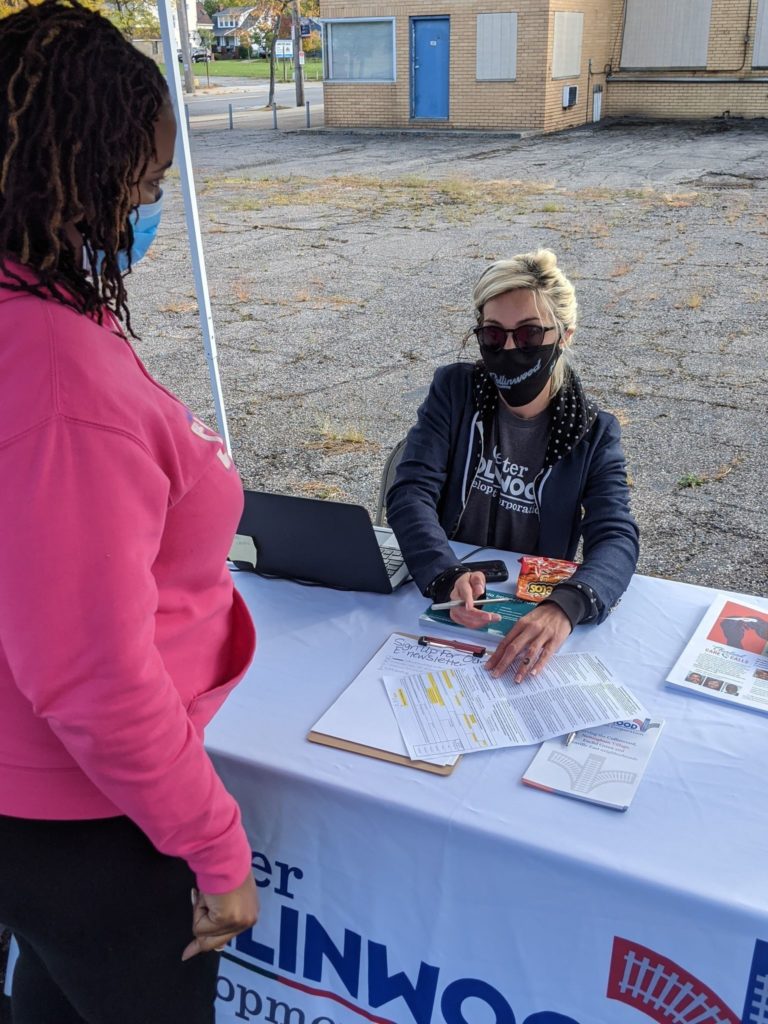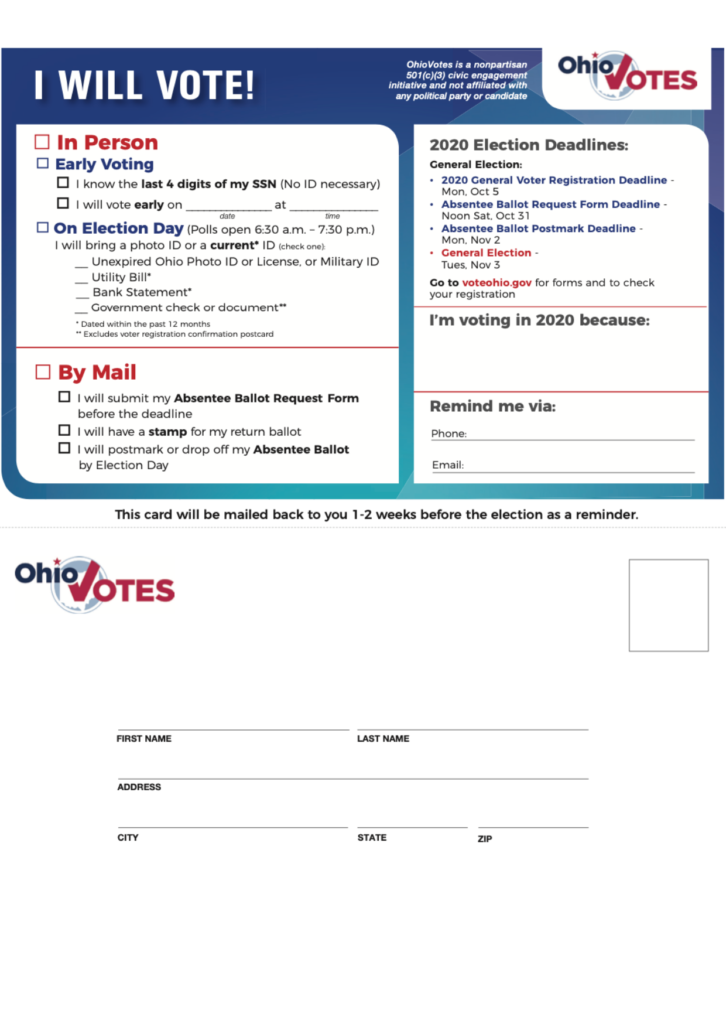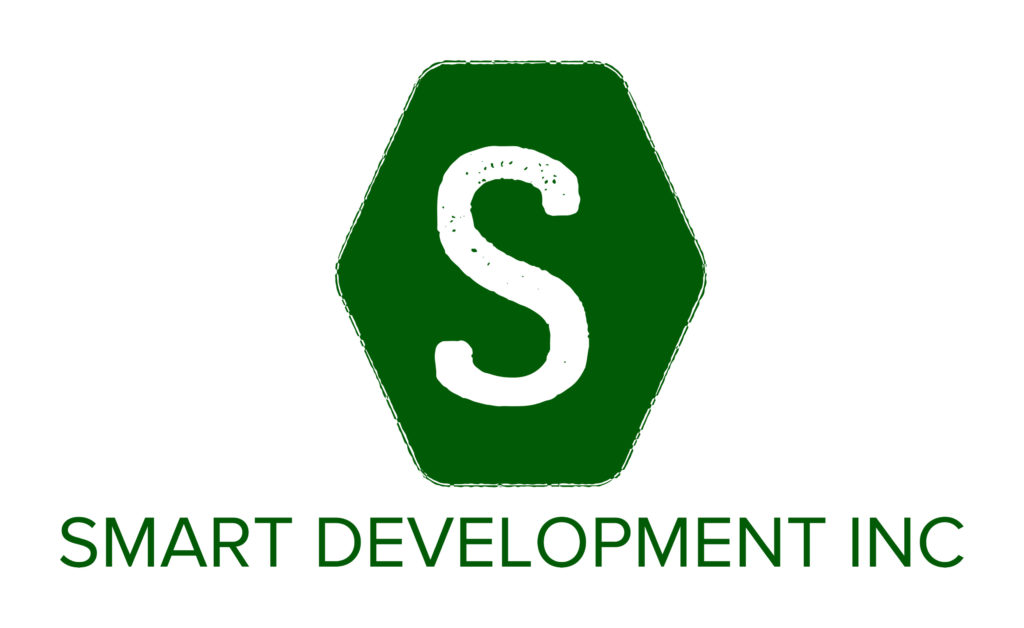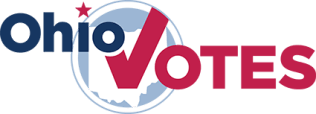
Ohio VOTES/Coalition on Homelessness and Housing in Ohio
As a statewide coalition of hundreds of housing organizations and homeless service providers, COHHIO promotes a range of housing assistance services, public policy advocacy, and provides training and technical assistance. Ohio VOTES is COHHIO’s year-round, statewide, nonpartisan initiative to build civic engagement in Ohio’s low-income communities. Ohio VOTES works with housing providers, health centers, community centers, food pantries, homeless programs, and other nonprofits. By utilizing a Regional Liaison model where deeply embedded organizers can provide support and coordination for nonprofits, Ohio VOTES has created a hyperlocal and responsive infrastructure for voter engagement.
Cleveland VOTES, a Black-led organization that strives to educate, empower and connect with the citizens of Greater Cleveland, was the Regional Liaison working with several sites, including Smart Development, Inc.
See the list of collaborating organizations below
Engaged the most low propensity voters out of all 2021 anchors

“Who could better gain the trust of the community other than those who come from the same community since Smart Development is also composed of refugee, immigrant, and Arab-identifying individuals?”
Melaak Rashid, Director of Development, Smart Development, Inc.
Collaborating Organizations: Access Center for Independent Living, Akron Votes, AxessPointe Community Health Centers, Bexley Library, Church 4 All People, Care Alliance Health Clinic, Cleveland Votes, Community Action Against Addiction, Dayton Food Pantry, Dayton Metro Library, Dayton Peace Museum, DCR, The Devil Strip, Dorothy Day House, Downtown Cleveland Alliance, Eta Tau Lambda Alpha Phi Alpha, First Grace United Church of Christ, First Unitarian Church of Cincinnati, Food Bank Mobile, Greater Cleveland Alumnae Chapter Delta Sigma Theta Sorority, Inc., Greater Collinwood Development Corporation, Hardesty Park, Horvitz YouthAbility of JFSA Cleveland, Hosack Baptist Church, House of the Lords, King Ave UMC, League of Women Voters of Akron, Greater Cleveland, Columbus, Greater Dayton, Greater Youngstown, LifeCare Alliance, Mahoning Youngstown, Montgomery
Pledge-to-vote card
In addition to asking people to register to vote, sites used pledge-to-vote cards that were customized for their state and featured the Ohio Votes branding. Important elements of the card include:
- Important dates
- Plan to vote
- Information about voting by mail
- Designed to be mailed back to the voter who has filled it out
Read more about creating pledge-to-vote cards in the Methods section of the Practitioner’s Report.

Site Case Study

About
Smart Development Inc is a 501c3 not-for-profit organization committed to providing services, programs, and resources to meet the needs of the ever growing diverse residents of Greater Cleveland and throughout Cuyahoga County. They focus their efforts in the following program areas: Housing First and Communities First. Housing First focuses on revitalizing our neighborhoods through housing rehabilitation and development services, while also aiding individuals and families in reaching financial stability and leading them to a pathway toward financial freedom. Communities First focuses on the additional needs within our communities that enable families and individuals to feel empowered and be able to lead lives with opportunities and the resources they need to survive.Smart Development Inc serves as a trusted-voice for the Arabic-speaking, Immigrant, Refugee, Ethnic Minority, and Muslim community. They are comprised of immigrants, first-generation Americans, and individuals of diverse backgrounds.
Why Smart Development Inc Engages Voters
Smart Development believes in building sustainable, thriving communities and has done that through their Housing First and Communities First program. They have always known civic engagement is critical to supporting the Arabic-speaking communities they serve and making sure they have a say in local, state, and national policy. As a relatively new organization, they were able to incorporate voter engagement into the work they do for the first time in 2020.
Key Takeaways
Smart Development Inc. saw a need and responded by developing and including programming around voter engagement alongside the many services they offer. This case study explores how and why civic engagement became a critical part of the services Smart Development Inc offers. It also shows how the organization tailored their program to fit the needs of the communities they work in to make voter registration and education accessible.
Responding to a Need
Ahead of the 2020 census, there had been hope that there would be a MENA (people of Middle Eastern and North African descent) category included in the survey. After a 2017 report released by the Census Bureau said it would be beneficial, it was approved. Later, in 2018, it was struck down and removed, citing a need for further testing.
The census controls the distribution of important resources like funding for public education and medical research and how voting districts will be redrawn for redistricting efforts. Removal of the MENA category left the Arab American refugees they serve feeling white-washed and unheard again leading to a mistrust in taking the census. Smart Development Inc jumped into action providing in-language resources and materials about the census in an effort to get members of their communities counted.
After the census was completed, voter engagement felt like a natural, next step. Organizers found that much of the mistrust and hesitancy toward taking the census was also present around getting involved in voting and elections. This was especially true for newly naturalized refugees who had a more limited understanding of the voting process. “We just felt like, who could better gain the trust of the community other than those who come from the same community since Smart Development is also comprised of refugee immigrant and Arab identifying individuals” said Melaak Rashid who leads development and community outreach at Smart Development Inc.
They integrated voter registration and pledge cards into the work they were already doing, making sure to provide in-language materials.
One example of how they integrated voter engagement was at food pantries. They had tables set up with voter engagement materials where families could pick up their culturally relevant food boxes (halal, kosher, etc.) where they actually got products the families could eat and use. They also made sure all their materials were available in Arabic, Farsi, Somali, and English.
Their greatest success was collaborating directly with businesses. They identified businesses that are refugee, immigrant, or Arab-identify minority owned and partnered with them to provide voter engagement materials to their customers. The businesses spanned restaurants, grocery stores, salons, accountants, lawyers and more. Some merchants gave out free swag bags with information in multiple languages and QR codes that led them to sites where they could pledge to vote or register. A local barber shop added the QR codes to all their merchandise.
“That was really wildly successful because a lot of these places we worked with have regular customers that they’ve built a relationship with. A lot of the times the neighborhoods they were in also had low voter turnout. By engaging the businesses who a lot of these residents rely on for their food, their haircuts, their merchant needs, they already have that trusting relationship and were accepting of the information being put in their bags, remarked Melaak.
As Smart Development Inc. look at continuing their voter engagement work, they are considering hiring a civic engagement coordinator who can dedicate all their time to this. “We do need an individual lead, but the beautiful part is that we have that volunteer base who wants to be a part of it,” says Melaak. Having someone dedicated to the work would help them overcome some of the challenges they faced in their first year and continue to strengthen their civic programming.

